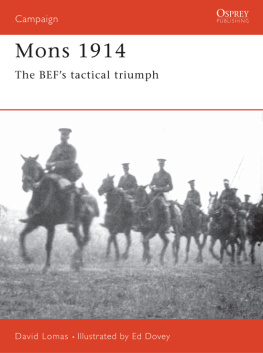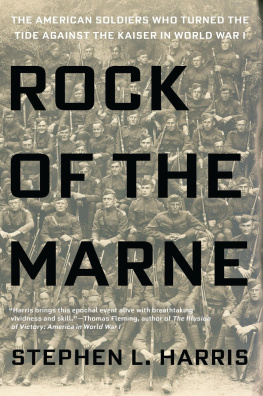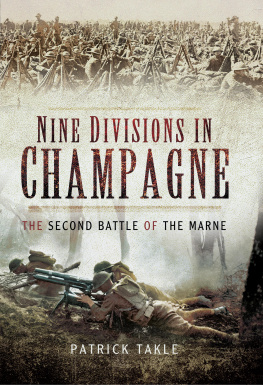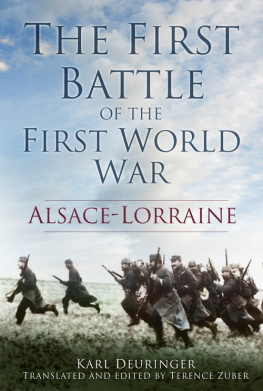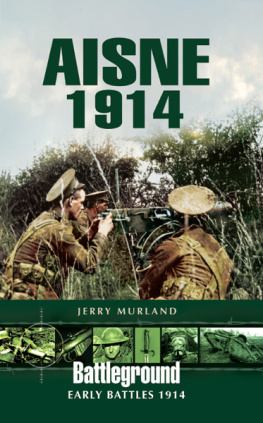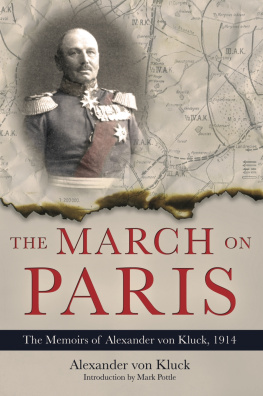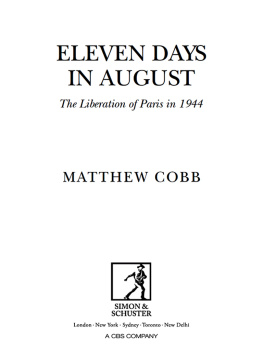15 DECISIVE VICTORY
SPREAD OUT on the table was a map of the 9th Army front. Foch took some matches out of a box, broke one of them in two, and said:
This half represents one division. The whole matches each represent army corps. Now watch carefully. I take the 42nd Division, which was here, at Broyes, and I move it; so.
The broken match moved over from the north-west to the south-east, near Linthes.
This is where we took the worst knock; our front is bent inwards. You see the 42nd Division coming along? You see it, dont you, Ferrasson ?
Lieutenant Ferrasson was the youngest officer on the staff. One of his duties (and he excelled at it) was to entertain the Army Commander. After a long spell of hard work with Weygand (during which the attentive Weygand would give his own clarity and precision to his chiefs brilliant, explosive, but disjointed monologue) Foch would send for young Ferrasson. Come on, Ferrasson, come out for a walk. Unlike Joffre, Foch was by no means silent during these walks; he would talk endlessly on every kind of subject; history, philosophy, or political economy. But, for the moment, Ferrasson was watching the match sliding across the paper. The more the enemy advanced against the centre of the Army front, the more effective would be the blow against its flank; this was obvious.
What do you think?
Im sure it will work, Sir.
Right. Lets go out for a walk.
And Foch talked on, apparently deaf to the terrific bombardment away to the north. An hour earlier, just before lunch, he had signed a proclamation to his troops: According to information received by the 9th Army H.Q., the German Army, after continuous marching and unremitting efforts since the opening of the campaign, has now reached the extreme limit of its resources. The vigorous offensive in which our troops have been engaged for the past three days has caused consternation in the enemy ranks, for they had been convinced that we should offer no resistance. It is vitally important to exploit the present situation. Everyone must be thoroughly convinced that success comes to him who holds on the longest. What is more, the news from the front line is excellent.
Foch was right. He had only to look at his own men to realise that the German soldiers, who had marched just as far and just as long as the French, were at the end of their tether. And there could be no doubt whatever that the courage and stamina of the French, when they turned and faced the enemy, had taken the Germans completely by surprise. As to the news from the front line, Foch was referring, no doubt, to the other armies; for any ordinary soldier in the 9th Army could see for himself that things were not going well.
Very heavy losses. It is difficult to judge if the 9th Corps (on the left of the Army front) can hold out until the 42nd Division reaches its assault positions. So (in effect) read the message just received by telephone from General Dubois. On the right, General Eydoux, when Second-Lieutenant Tardieu brought him yet another order to attack, had grimly snorted: What do you expect me to attack with? My own escort? (It was, in fact, the same General Eydoux who, the day before, when his troops had already been severely buffeted, had informed Foch by telephone that the positions lost would be re-occupied by fresh, well-disciplined troops.)
The critical point on the front was Mondement, from which it was still feared the Germans might debouch in order to occupy the plateau above. The Moroccan Division, under General Humbert, were under orders to attack it once again, with the help of the 77th Infantry, who had been withdrawn from the line on the morning of the 8th and had spent the night of the 8th/9th near St-Gond, in drenching rain and squelching bivouacs. The description fresh troops was certainly well-chosen.
As has already been said, the Chteau de Mondement was masked from the French artillery by the woods around it. The effect of the preliminary bombardment was for this reason disappointing. Nevertheless, Major Beaufort, wearing white gloves, as was his custom on these occasions, raised his hand and shouted: Forward, The Fifth! Pour la France! A bugler beside him sounded the charge; and the men marched off in column of eight, as if on parade.
One company reached the foot of the walls, which the preliminary bombardment had breached at three places. Three only. There was no other way in. The problem facing the German machine-gunners barricaded inside was thus reduced to its simplest expression: they had only to keep the breaches well under fire. Any Frenchman who showed himself there was shot down. Meanwhile, the infantry, the Zouaves, and the Tirailleurs following them were being enfiladed from the large farm immediately west of the chteau. The attack had failed, and they had to withdraw to the shelter of the woods.
They had no sooner done so than an order arrived from General Humbert: The Beaufort battalion will resume its attack on the chteau tonight. For the moment the Beaufort battalion was taking what cover it could at the foot of the walls, amidst the heaps of their dead lying in front of the three breaches. Anyone attempting to leave the precarious shelter of the walls was shot down as he entered the murderous zone of fire from the flank.
On Fochs left the 5th Army was continuing its advance, its right forcing back von Blows right, which, in fact, was already beginning its withdrawal. The officers had to order frequent halts, for their men grew quickly tired; but fatigue did not lower their morale, so long as they could be given sufficient rest. Near Marchais, General de Maudhuy (who was constantly on the move) passed the 49th and 18th Infantry regiments, halted beside the road. The men were in high spirits, laughing, joking and dressing themselves up in German helmets and haversacks. They had been detailed to pile up the German swords and rifles lying around. Vive le Gnral! they cried.
At about 13.30 Maudhuy received a message stating that Chteau-Thierry was apparently clear of Germans, or only lightly held. This was great news, for, once Chteau-Thierry was captured, the French could storm into the Ourcq valley and cut off von Klucks retreat. The 18th Corps orders, however, would have sent them too far north-east.
Bring my car, at once, said Maudhuy. To Army H.Q., Montmirail !
The roads were congested with the supply columns following up the advancing troops. Maudhuy, with his head through the window, shouted at the drivers to let him pass. At one point, while he was edging his way past a load of steel girders, the inevitable happened; he was struck on the head; and on his arrival at Montmirail the Army H.Q. staff officers saw him stagger out of his car with blood trickling down his face.
Its nothing at all, said Maudhuy. Where is the General?
Nevertheless, he was persuaded to have his wound dressed. Franchet dEsperey was absent, but his Chief of Staff agreed: Yes, march on Chteau-Thierry. The roads, however, were no less congested on the return journey. At one cross-roads the gendarmes, who had been striving (with little success) to disentangle a truly Gordian knot of traffic, suddenly heard a loud screech of brakes and saw a car turning out of the Nogent-lArthaud road. Then shots rang out. The person inside, firing his revolver out of the window, had an enormous bandage round his head.
I am General Maudhuy! Clear this blasted mess out of my way!
Three carts were duly tipped over into the ditch; and the generals car went through.
The cavalry detailed to enter Chteau-Thierry were forced to move, however, at a more leisurely pace. In the 20th Dragoons that morning, one hundred and fifty-three horses were found to be unfit for the road, even at a walk. No more than half the regiment could take part in the operation. The leading troopers legged and spurred their weary mounts into a trot as they crossed the first railway bridge; but a little later a burst of rifle-fire put several horses out of action; and the Dragoons dismounted.


